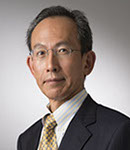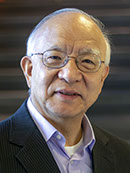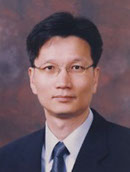
Keynote Speeches
Keynote 1

Data Challenges Towards the Realization of Society 5.0 Vision
Masaru Kitsuregawa
Director General of National Institute of Informatics and Professor at Institute of Industrial Science, the University of Tokyo
Date & Time
09:00-10:15 February 20th (Thursday), 2020.
Abstract
A significant effort, called Society 5.0, is trying to transform the Japanese society to become more data driven.
This talk will focus on the challenges of Society 5.0, with concrete examples in the environmental area. Last year, floods from very heavy rain caused about 200 fatalities in Western part of Japan, and this year, a big typhoon cost about 100 persons' lives in Eastern part of Japan. We have been developing the DIAS data platform for earth environmental big data, towards effective mitigation of natural disasters such as preventive dam water release to avoid flooding due to heavy rain. As another important data challenge area, data driven healthcare system for medical imaging such as radiology biopsy endoscopy also will be shown.
Bio
Masaru, Kitsuregawa is a Director General of National Institute of Informatics and Professor at Institute of Industrial Science, the University of Tokyo. Received Ph.D. degree from the University of Tokyo in 1983. Served in various positions such as President of Information Processing Society of Japan (2013–2015) and Chairman of Committee for Informatics, Science Council of Japan(2014-2016). He has wide research interests, especially in database engineering. He has received many awards including ACM SIGMOD E. F. Codd Innovations Award, IEICE Contribution Award, IPSJ Contribution Award, 21st Century Invention Award of National Commendation for Invention, Japan and C&C Prize. In 2013, he awarded Medal with Purple Ribbon and in 2016, the Chevalier de la Legion D’Honneur. He is a fellow of ACM, IEEE, IEICE and IPSJ.
Keynote 2

Mining Unstructured Big Text: A Multi-Dimensional Analysis Approach
Jiawei Han
Abel Bliss Professor, Department of Computer Science, University of Illinois at Urbana-Champaign
Date & Time
11:15-12:30 February 21st (Friday), 2020.
Abstract
The real-world big data are largely unstructured, interconnected, and dynamic, in the form of natural language text. It is highly desirable to transform such massive unstructured data into structured knowledge. Many researchers rely on labor-intensive labeling and curation to extract knowledge from such data. However, such approaches may not be scalable, especially considering that a lot of text corpora are highly dynamic and domain-specific. On the other hand, massive text data itself may disclose a large body of hidden patterns, structures, and knowledge. Equipped with domain-independent and domain-dependent knowledge-bases, we should explore the power of massive data itself for turning unstructured data into structured knowledge. By organizing massive text documents into multidimensional text cubes, structured knowledge can be extracted and used effectively.
In this talk, we introduce a set of methods developed recently in our group for such an exploration, including mining quality phrases, entity recognition and typing, multi-faceted taxonomy construction, and construction and exploration of multi-dimensional text cubes. We show that data-driven approach could be a promising direction at transforming massive text data into structured knowledge.
Bio
Jiawei Han is Abel Bliss Professor in the Department of Computer Science, University of Illinois at Urbana-Champaign. He has been researching into data mining, information network analysis, database systems, and data warehousing, with over 900 journal and conference publications. He has chaired or served on many program committees of international conferences in most data mining and database conferences. He also served as the founding Editor-In-Chief of ACM Transactions on Knowledge Discovery from Data and the Director of Information Network Academic Research Center supported by U.S. Army Research Lab (2009-2016), and is the co-Director of KnowEnG, an NIH funded Center of Excellence in Big Data Computing since 2014. He is Fellow of ACM, Fellow of IEEE, and received 2004 ACM SIGKDD Innovations Award, 2005 IEEE Computer Society Technical Achievement Award, and 2009 M. Wallace McDowell Award from IEEE Computer Society. His co-authored book "Data Mining: Concepts and Techniques" has been adopted as a textbook popularly worldwide.
Keynote 3

Hybrid Deep Learning with Explainable Latent Space for Big Data Analysis
Sung-Bae Cho
Professor, Yonsei University
Date & Time
11:15-12:30 February 22nd (Saturday), 2020.
Abstract
Latent space in a deep learning model provides an important representation on the problem at hand, which propels efficient data analysis and high performance classification. Variational autoencoder (VAE) is the most popular to explore the latent space using variational inference, but has limitations for practical application as it only approximates the latent space with a simple Gaussian distribution. In this talk, we present several techniques to exploit the latent space by defining it with a mixture of multivariate Gaussian distributions and a distribution like constant curvature manifold (CCM). In order to verify them, we present three applications such as predicting electric power demand, detecting malware for cyber security, and detecting anomalies in video sequences: 1) the state-explainable autoencoder for encoding power demand up to the present and transcribing them into the latent space, 2) the latent space predefined with a mixture of multivariate Gaussian distribution for enhancing the performance of malware generation and detection, and 3) an adversarial autoencoder based on CCM for detecting various outliers in the surveillance video. Lastly, we address some issues on the future of deep learning for practical data analysis.
Bio
Dr. Cho received the Ph.D. degree in computer science from KAIST (Korea Advanced Institute of Science and Technology), Korea, in 1993. He was an Invited Researcher of Human Information Processing Research Laboratories at Advanced Telecommunications Research (ATR) Institute, Japan from 1993 to 1995, and a Visiting Scholar at University of New South Wales, Australia in 1998. He was also a Visiting Professor at University of British Columbia, Canada from 2005 to 2006. Since 1995, he has been a Professor in Department of Computer Science, Yonsei University, Korea. His research interests include hybrid intelligent systems, soft computing, evolutionary computation, neural networks, pattern recognition, intelligent man-machine interfaces, and games. He has published over 230 journal papers, and over 680 conference papers. According to google scholar, total citations are 12,216 (5,118 since 2014), h-index is 52 (32 since 2014), and i10-index is 223 (119 since 2014). The most cited publication was “Combining multiple neural networks by fuzzy integral for robust classification,” 1995 (453 citations).
ⓒ Copyright 2020 KIISE – All Rights Reserved.
[KIISE] Korean Institute of Information Scientists and Engineers
#401 Meorijae Bldg., 76, Bangbae-ro, Seocho-gu, Seoul 06704, Korea
Phone: +82-2-588-9240 | Fax: +82-2-521-1352 | Email: ejmoon@kiise.or.kr | Homepage: www.kiise.or.kr
Business Registration Number: 114-82-03170
SCMember-board
